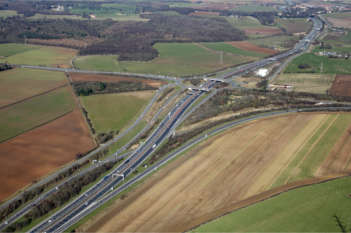Transport Network has reported extensively on the Major Road Network (MRN) plans, from the initial concept under the Rees Jeffreys Road Fund report to the Department for Transport (DfT) consultation released late last year (Jan/Feb Highways). With the consultation having closed in late March and ministers now considering their next moves, Dominic Browne reports on reactions from leading professional bodies.
As regular readers will know, the original MRN concept – joining the strategic road network with key local routes into an integrated whole – is quite different from the plans the DfT put before the sector from the turn of the year. While its impact could still be wide-reaching there is an understanding that it is not going to be the saviour of the underfunded local network, as some might have originally hoped.
What was once a dramatic re-evaluation of the entire network, under a data-led analysis of what makes a road strategic, looks much more like a platform for new bypasses and major enhancements. As, under the plans, local authorities will still be responsible for maintaining these enhancements, it could actually result in greater strain on local maintenance budgets.

A senior Department for Transport (DfT) official told Highways that the initial purpose of the fund would likely be to focus on major schemes and enhancements and the department was not considering providing any dedicated maintenance cash under the MRN plans; rather this would be funded by the existing grants. They also suggested that there would be no specifications for the MRN to ensure a baseline of user experience or maintenance levels outside of the wider local network. ‘That is not an idea the DfT is running with,' they said.
However, from comments this official made and comments previously reported in Highways by Tricia Hayes, director general for roads, motoring and devolution at the DfT, it is possible this could change as the MRN beds in.
The senior official told Highways the first priority is to get the MRN mapped out and understood before taking on wider issues and its full potential.
The question posed by the likes of the Local Government Technical Advisers Group (TAG) and the Chartered Institution of Highways and Transportation (CIHT) is: what kind of a start are we facing for the system if we don't get the foundations right? Sadly, it is clear that experts at these bodies are not sure we have the right foundation.
TAG's consultation response rejected much of the basis of the DfT's plans and stated that it had ‘grave concerns'.
‘If it is intended that the primary purpose of this funding is to reduce congestion, then as we have previously stated, an integrated approach to transport policy needs to be adopted, rather than wholesale widening of parts of the road network, especially between or on the approaches to major towns and cities.
‘For most users of the SRN or indeed MRN, there is no realistic alternative route and further enlargements of either will result in much greater chaos when a link breaks down as the rest of the road network will not have a chance of carrying such large flows.'
It went on to add: ‘We consider that the approach as outlined will not deliver the required outcomes and will more likely contribute to exacerbating congestion, not only on the SRN and MRN networks but elsewhere.'
In terms of unlocking growth and housing, TAG stressed that ‘urban areas are generally the engine for the local and national economy; to open up areas for industrial growth it is local access roads to existing and redevelopment sites [such as] ports' that would be needed.
It also called for more focus on redevelopment, that is making the most of brownfield sites rather than new developments.
These ideas were echoed and in some cases elaborated upon by the CIHT. In its response to the consultation, it stated: ‘CIHT suggests that a consistent network also requires a sustained asset management and maintenance plan, otherwise there is the risk of a gradual diversion of standards and expectations of the network. There is a great deal of variation in the quality of locally managed roads which should be avoided as much as possible within the MRN and SRN.'
It also questioned whether the focus on enhancements and major renewals was ‘the best method of achieving the objectives and priorities of the MRN'.
‘Reducing congestion, improving journey reliability and supporting economic growth may all be better supported by a well applied asset management and road safety strategy rather than by focusing on new schemes.
‘This is also true from a fiscal perspective as the DfT states that RIS1 "showed that there can be significant value for money from maintenance and renewal schemes, with an average return of £13 for every £1 spent (Transport Investment Strategy, Page 28) which compares with a £4.5 to every £1 average return from RIS1 schemes (Transport Investment Strategy, Page 29)".'
Both TAG and the CIHT have called for decision-making to be made a local level and rejected plans for competitive bidding around the fund. They also called for joined up working between local groups and departments to fully realise the potential of the MRN for unlocking housing, while warning against creating car-dependent communities through the MRN.

‘Proposals for MRN funding should include health impact assessments to ensure that they are not discouraging active travel and are achieving the potential to save money for the public sector overall rather than focusing on a narrowly defined purpose of transport,' the CIHT said.
In terms of governance, concerns were raised about the capacity of sub-national transport bodies to draw up data-heavy evidence bases for MRN plans and the potential for political battles to creep into the allocation of MRN cash. The concept was originally intended as a way of putting roads management on a more evidence-based platform so as to address issues around funding, ensure a level playing field across the country and support equality between strategic and local roads.
However, it is important to state that this is early days. A response from the DfT could be coming this summer but the noises coming from within the department suggest that the MRN, if delivered, could develop over time. In short, this is the start of a process and it is likely to evolve.
To give some idea of where it could potentially lead, the CIHT also stated in its response: ‘CIHT believes that there is room for innovation and forward thinking in the funding of the road network.
‘Regional Evidence Bases may include evidence of land value uplift as a result of specific schemes, and develop proposals to take advantage of that through taxation to maintain the roads which create that value.
‘CIHT suggests that the assessment of the network's overall condition and performance should be considered in terms of total expenditure (totex) rather than separating capital expenditure and operations expenditure. It is the overall finance envelope which should determine decision-making rather than at what stage money is spent.'
This point was made by the new TAG president, John Lamb, in his opening address to TAG's annual conference in May. Is it possible the MRN could yet become a radical test bed for a new alignment of financing and strategy? Time will tell, but local leaders should not lose heart yet.
































